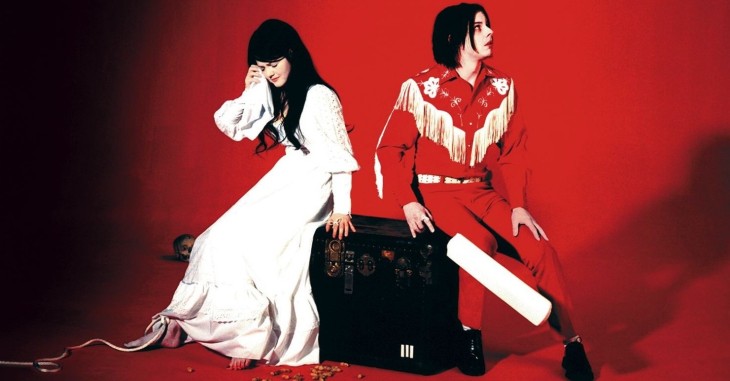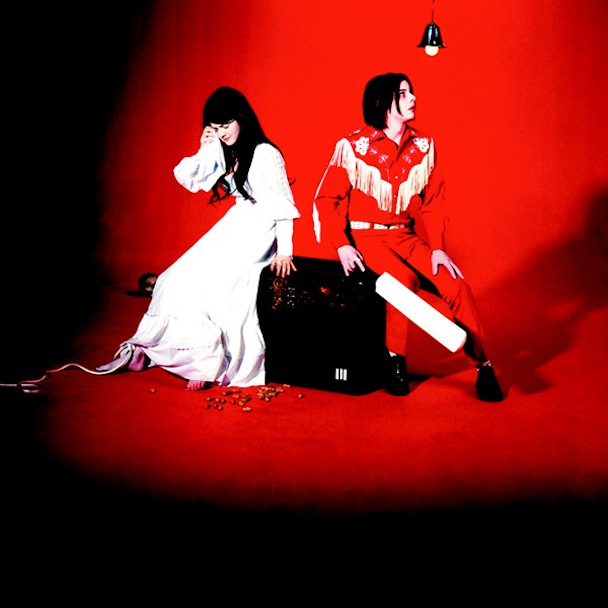Hall of Fame: The White Stripes – Elephant

Treble is celebrating its 10-year anniversary by posting a series of articles that reflect the last 10 years of music, including a series of Hall-of-Fame essays on significant albums released between 2003 and 2013. These are albums that left a significant impact not just on us, but also music on a greater scale (but mostly on us). We’ll be posting a new reflection on a significant album from the past 10 years every day for the next few weeks.
How The White Stripes Revived My Dead City Radio
I grew up pretty sheltered — so sheltered that in those moments when I wasn’t sheltered I was late to many of life’s parties. “I had opinions / That didn’t matter / I had a brain / That felt like pancake batter.” When I started college at Drexel University, my musical tastes were in the process of being formed and reformed beyond Top 40 and AOR by people far more in touch than I. My senior year in high school was full of college-rock outsiders plugging their R.E.M. and Dead Milkmen, their 10,000 Maniacs and The Cure and They Might Be Giants. There was WXPN at the left of the radio dial, the surprisingly powerful signal next door to Drexel at the University of Pennsylvania, back when World Cafe hadn’t yet taken on the patina of NPR mainstay. And there was Drexel’s own 110-watt gadfly, the militantly anti-commercial WKDU, which hosted when-they-were-young shows by the likes of Nine Inch Nails and Fugazi riiiiiight before I knew about them.
Joining Drexel’s campus newspaper and, later, that radio station first immersed me in musical media: Five years of concert reviews, interviews, and more music than I knew what to do with passing through my fingers. But in the fall of 1992, there came something of a radio interloper. WDRE bled into the Philadelphia market on 103.9 FM, simulcast from Garden City, New York. Through various business decisions and format flips and mergers over the years, their sound and staff ended up being folded into WPLY down the dial at 100.3. Despite “Y100” being marketed as the area’s leader in modern rock, there was something about their playlist that long prevented my dedicated listenership: They always felt less genuine than WXPN, with more errors in programming judgment than stations like hard/classic rock stalwart WMMR, and by default far smoother than WKDU. “I’m only waiting for the proper time to tell you / That it’s impossible to get along with you.”
My involvement in music disappeared, and my tastes stagnated, after I left Drexel. Hell, I still feel like I’m catching up. It would take a job during the bursting dot-com bubble at the turn of the century to get me to actively discover music again. “I need the fuel to make my fire burn bright / So don’t fight it any longer.” This was during the rise of Napster and MP3 player software; my IT colleagues and even my boss scoured peer-to-peer networks alongside me, sneaking searches in between software builds. I was listening to a lot of music on work and home computers, burning CDs for car rides and event background music. I was hunting down remixes, live tracks, and back-catalog albums, but not really finding new music of much interest to me—not even really looking for it all that much, come to think of it.
It is the spring of 2003, and unbeknownst to me I am on the backside of both my first marriage and my time with a stuffy financial typesetting firm. We use data and boilerplates to make the annual reports and prospecti for investment houses, and file that information with the Securities and Exchange Commission. It is über-procedural graphic design; the only thing drier and more regulated might be pharmaceutical packaging. In the building’s cubicles I run into what hindsight tells me are my first so-called hipsters. “Acetaminophen / You see the medicine.” There’s the thin brunette who fetishizes both Radiohead and the borough of Brooklyn. There’s also the moody dude never far from a blazer, a philosophy book, or his hard drive of eclectic MP3s—Genesis, Boards of Canada, Dead Can Dance, Interpol’s then-new Turn on the Bright Lights.
In addition to my coworkers’ tastemaking I am discovering streaming audio, not yet blocked by corporate firewalls. “A seven nation army couldn’t hold me back.” I latch onto a feed from legendary station WOXY out of Cincinnati; they quickly fulfill my first instant-messaged request (Beastie Boys), then ship me a musical grab bag as a new-listener thank-you. The highlight in there is Longwave’s The Strangest Things, whose “Wake Me When It’s Over” remains one of my all-time favorite songs. My words and DJ shifts at Drexel made me feel like part of a set of professional-minded rebels. I was hearing and feeling that for the first time in a long time, ready to regain some sense of exploration.
We reach quitting time one afternoon. I am driving home going up the Blue Route, part of the highway system forming connective tissue through the suburbs of Philadelphia. These roads can be slow going, and I cycle through my radio presets. Y100 is on there, still something of a necessary evil. I press the button as drive-time DJ Matt Cord comes on to announce his “play of the day,” or whatever he calls that day’s intriguing non-rotation track. Very bluesy! Recorded on vintage equipment! There’s a hum, then a strum, and a simple drum before all sonic hell breaks loose. “And right now you could care less about me / But soon enough you will care, by the time I’m done.”
It is “Ball and Biscuit,” the halfway point of Elephant, and I nearly drive over cars in front of me like ramps. The traffic clears and the screaming sex of my first Jack White power solo makes me floor my brave little Ford Focus towards the nearby turnpike, pushing 100 MPH, state police and tollbooths be damned. In those few minutes I forgive Y100 for their prior deaths by many thousands of cuts—their dalliances with joking hip-hop and nu-metal, the stench of ‘90s one-hit wonders still clinging to them. They have exposed their cojones. You don’t play a garage-rock deep cut, a seven-minute blues track outside of your standard programming clock, and expect the disaffected and expatriate to not notice. I am brought back around. I commit to another go-to option in the presets.
And who is this quartet actually making the music? That’s what they sound like at first blush—I am unaware that they are just a strained husband and wife hiding behind brother and sister personae. This track portrays them scummy and huge, though: it’s the music of bullets and snakebites. Rare were the times when a song from the radio sent me on a frantic scavenger hunt. “Ball and Biscuit” was the call to find one of Willy Wonka’s golden tickets. “What kind of cartwheels do I have to pull?” Lucky for me, I know this moody hipster typesetter guy; he has one under a red and white peppermint wrapper.
How impossible is it to fathom that “Ball and Biscuit” is just some sweetbread hiding beneath the choice cuts of Elephant? That refers mostly to the four singles: a squealing take on the Bacharach/David tune “I Just Don’t Know What to Do with Myself,” the false ecstasy of “There’s No Home for You Here,” future soccer chant “Seven Nation Army,” and the Michel Gondry video vehicle “The Hardest Button to Button.” “It sounded like an earthquake.” I must also profess serious love for the crunchy “Black Math,” which I’m sure I heard on the radio at some point. And there’s the cute slacker country stuff to soften blows and offer needed contrast—“Well It’s True That We Love One Another,” “You’ve Got Her in Your Pocket,” “In the Cold, Cold Night.” Regardless of the amp volume, these are all tales in the same anthology of hearts breaking and hearts healing.
There are some albums more important to me than Elephant, and some I own and know of that are better from within these last 10 years. They could certainly have earned a place in this hallowed Treble hall of fame. But Elephant is where the process started to move me to my current place in music and with music, and by extension music’s current place within me. “Put it in a safe and lock it / ’cause it’s home sweet home.” There were other interceding events to guide me through life—the divorce, more jobs, a move downtown—but sometimes it’s the small moments that stick with you the most. I was working with a record label and retail music shop within about a year after hearing “Ball and Biscuit.” Within six more months I tacked on new efforts in music journalism. Six more, and I was volunteering to help refugees from Y100, recently flipped to a rap format, pick through the rubble of their station and DJ for them online. Exciting times.
Elephant was the laser level that pointed a steady line towards the past and the future. I found it fit snugly in music history’s guitar-and-drums timeline between Flat Duo Jets (in the same orbit as my beloved R.E.M. thanks to Athens, GA: Inside Out) and The Black Keys. Elephant got its wires crossed with my electronica feed, as I heard “Seven Nation Army” bootlegged onto white-label vinyl and mashed up with Bon Jovi. Elephant eventually gave me entreé to previously unentered clubs and long-distant festivals, including Lollapalooza, which was far outside of my sheltered universe back in the best-lineup-ever days of ’91 and ’92. “Take all your problems / And rip ‘em apart.” Elephant and its garage revival suggested everything old could be new again—the angular post-punk in Franz Ferdinand and Bloc Party, the burgeoning No Wave funk legend of LCD Soundsystem, the new disco of Hercules & Love Affair, and apparently me.
So thank you, Jack and Meg and Matt Cord, wherever you are. That was one hell of a ride.
The White Stripes: Elephant
Note: When you buy something through our affiliate links, Treble receives a commission. All albums we cover are chosen by our editors and contributors
Adam Blyweiss is associate editor of Treble. A graphic designer and design teacher by trade, Adam has written about music since his 1990s college days and been published at MXDWN and e|i magazine. Based in Philadelphia, Adam has also DJ’d for terrestrial and streaming radio from WXPN and WKDU.


